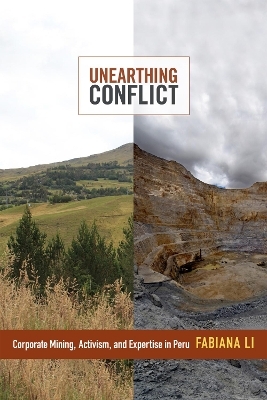
Unearthing Conflict
Corporate Mining, Activism, and Expertise in Peru
Seiten
2015
Duke University Press (Verlag)
978-0-8223-5819-0 (ISBN)
Duke University Press (Verlag)
978-0-8223-5819-0 (ISBN)
Fabiana Li examines the politics surrounding the rapid growth of mining in the Peruvian Andes, arguing that anti-mining protests are not only about mining's negative environmental impacts, but about the legitimization of contested forms of knowledge.
In Unearthing Conflict Fabiana Li analyzes the aggressive expansion and modernization of mining in Peru since the 1990s to tease out the dynamics of mining-based protests. Issues of water scarcity and pollution, the loss of farmland, and the degradation of sacred land are especially contentious. She traces the emergence of the conflicts by discussing the smelter-town of La Oroya—where people have lived with toxic emissions for almost a century—before focusing her analysis on the relatively new Yanacocha gold mega-mine. Debates about what kinds of knowledge count as legitimate, Li argues, lie at the core of activist and corporate mining campaigns. Li pushes against the concept of "equivalence"—or methods with which to quantify and compare things such as pollution—to explain how opposing groups interpret environmental regulations, assess a project’s potential impacts, and negotiate monetary compensation for damages. This politics of equivalence is central to these mining controversies, and Li uncovers the mechanisms through which competing parties create knowledge, assign value, arrive at contrasting definitions of pollution, and construct the Peruvian mountains as spaces under constant negotiation.
In Unearthing Conflict Fabiana Li analyzes the aggressive expansion and modernization of mining in Peru since the 1990s to tease out the dynamics of mining-based protests. Issues of water scarcity and pollution, the loss of farmland, and the degradation of sacred land are especially contentious. She traces the emergence of the conflicts by discussing the smelter-town of La Oroya—where people have lived with toxic emissions for almost a century—before focusing her analysis on the relatively new Yanacocha gold mega-mine. Debates about what kinds of knowledge count as legitimate, Li argues, lie at the core of activist and corporate mining campaigns. Li pushes against the concept of "equivalence"—or methods with which to quantify and compare things such as pollution—to explain how opposing groups interpret environmental regulations, assess a project’s potential impacts, and negotiate monetary compensation for damages. This politics of equivalence is central to these mining controversies, and Li uncovers the mechanisms through which competing parties create knowledge, assign value, arrive at contrasting definitions of pollution, and construct the Peruvian mountains as spaces under constant negotiation.
Fabiana Li is Assistant Professor of Anthropology at the University of Manitoba.
Acknowledgments vii
Introduction. A Mining Country 1
Part I. Mining Past and Present
1. Toxic Legacies, Nascent Activism 35
2. Mega-Mining and Emergent Conflicts 71
Part II. Water and Life
3. The Hydrology of a Sacred Mountain 107
4. Inrrigation and Contested Equivalences 143
Part III. Activism and Expertise
5. Stepping outside the Document 185
Conclusion. Expanding Frontiers of Extraction 215
Notes 235
References 243
Index 257
| Zusatzinfo | 20 illustrations |
|---|---|
| Verlagsort | North Carolina |
| Sprache | englisch |
| Maße | 152 x 229 mm |
| Gewicht | 503 g |
| Themenwelt | Geisteswissenschaften ► Geschichte ► Regional- / Ländergeschichte |
| Naturwissenschaften ► Biologie ► Ökologie / Naturschutz | |
| Sozialwissenschaften ► Ethnologie | |
| Sozialwissenschaften ► Politik / Verwaltung | |
| Sozialwissenschaften ► Soziologie | |
| Technik ► Bergbau | |
| ISBN-10 | 0-8223-5819-0 / 0822358190 |
| ISBN-13 | 978-0-8223-5819-0 / 9780822358190 |
| Zustand | Neuware |
| Informationen gemäß Produktsicherheitsverordnung (GPSR) | |
| Haben Sie eine Frage zum Produkt? |


